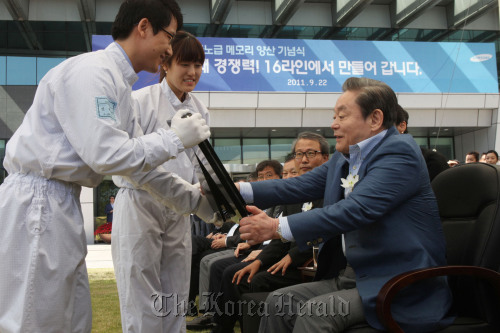Samsung chief calls for technological advancement to weather tough conditionsThe global semiconductor industry is far from looking fine, and this spells trouble for Korea where some of its most high-tech companies such as Samsung Electronics and Hynix Semicondutor depend on semiconductors for revenue.
Mounting fears of yet another global recession are dampening the demand for electronic products, including PCs and consumer devices. The deteriorating situation has caused market researchers such as IHS iSuppli and Gartner to recently cut their forecasts of semiconductor revenues for both this and next year.
Samsung, the world’s biggest supplier of memory chips, also is apparently feeling the heat, as seen in chairman Lee Kun-hee’s recent remarks at a ceremony held marking Samsung’s start of mass producing the 20-nano Dynamic Random Access Memory chips.
On Thursday, Samsung officially became the first company in the world to produce these advanced technology chips en-masse.
It should therefore have been a happy day for Lee, but the chairman instead saw the festivities as a chance to once again trumpet his concerns about the fast-changing business conditions for chipmakers.
“We must be prepared for a typhoon in the semiconductor industry,” Lee said, in what many interpreted as a metaphor to warn his employees that without further technological breakthroughs, chipmakers will face even more challenges in the future.

Samsung Electronics chairman Lee Kun-hee (right) receives the first semiconductor wafer produced in a new production line at a ceremony to mark the operation of Samsung’s 16th production line in Hwaseong, Gyeonggi Province, on Thursday. (Samsung Electronics)
Experts have warned that NAND flash memory demand in the wireless sector may have grown on the fast growth of smartphones and tablet PCs ― hence a market fragmentation ― but that the DRAM industry is officially headed for a downturn, and the situation will worsen if the world dips into yet another recession.
IHS iSuppli said on Sept. 21 that it expects semiconductor revenue to grow by an “anemic” 2.9 percent, to $313.3 billion this year. The cut was a sharp about-face from the August growth it had forecast at 4.6 percent.
“Mounting economic weakness is taking its toll on the worldwide electronics and semiconductor industries just as these markets are entering the critical pre-holiday sales season,” according to Dale Ford, vice president of electronics supply chain and semiconductors for IHS iSuppli in a statement.
Gartner analysts had in the previous week dropped their semiconductor revenue estimates for both 2011 and 2012.
Lee is also seen to have been noting the thriving presence of other chipmaking rivals, such as in Taiwan and Japan, as yet another threat to Samsung.
Elpida, for instance, while it has yet to prove it actually is mass-producing the 25-nano DRAM chips it claimed to be capable of, has jolted Samsung and Hynix with its assurances of significant technological advancement.
Noting the competition, Chairman Lee last month told executives at the company’s semiconductor division that Samsung must stake out new territory in the chip market by developing next-generation memory chips at a faster pace.
But as the researchers are quick to point out, it’s not only about the chip-making technology, but a stagnant global and local economy that is taking a toll on the semiconductor industry.
Amid a string of downgrades for global economic growth forecasts, analysts at HIS iSuppli said they see up to a 40 percent chance of another recession, which would mean the semiconductor market growth would be flat for this year.
An ensuing market volatility will mean the situation would unlikely stabilize until 2013, iSuppli said.
By Kim Ji-hyun (
jemmie@heraldcorp.com)






![[KH Explains] How should Korea adjust its trade defenses against Chinese EVs?](http://res.heraldm.com/phpwas/restmb_idxmake.php?idx=645&simg=/content/image/2024/04/15/20240415050562_0.jpg&u=20240415144419)